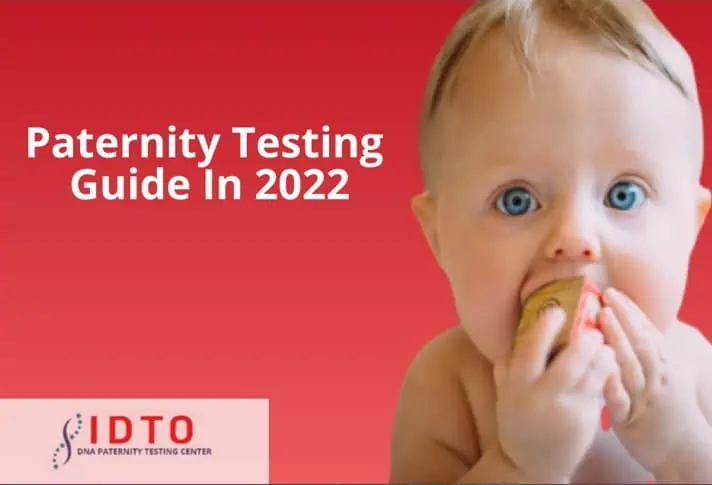
Here is your Ultimate Guide to DNA Paternity Testing. We at IDTO have decided to put together this guide on Paternity Testing due to the influx of questions about the Paternity Testing process. First, let me introduce myself. My name is Garth Harvey, and I am the Senior DNA Testing Specialist here at IDTO.
Over the past 18 years, IDTO has provided DNA Testing services to thousands of families nationwide. Many of these people tend to ask us the same question. How does this process work? So we decided to put together a 2022 brief guide on things you can expect to experience performing a paternity test to help alleged fathers and their families understand how the process works and what to expect from a Paternity Test. If you’re ready, let’s begin.
What I would like to do first is define the definition of Paternity. According to etymology online, “the definition of Paternity is the condition of being the father; fatherhood, fatherly. It is important, to do this, so there is a precise definition of what paternity means”.
Now there are a couple of things that I think that people should want to take into consideration when they are considering a Paternity Test.
Number one, what is it you are going to need to get the Paternity Testing process started?
Well, I’ll answer the question this way, if you are going to begin the process of performing a DNA Paternity Test, then you want to make sure some time is taken to think about how you would like to use the result in the short and long term. Now, what I mean is, there are two types of paternity tests, one is a legal paternity test, the other one is a non-legal paternity test or peace of mind paternity test.
Short Term DNA Paternity Test
We use the term short-term for a non-legal paternity test because it has no flexibility of use outside of giving the alleged father closure on knowing what his biological status is with a child. Remember, a non-legal paternity test is only for informational purposes, nothing else.
Long Term Flexible Paternity Test
Now, the second type of Paternity Test is the legal option, and there are various ways one may use a legal Paternity result. First, I would like to address the term “legal”. Now many people are confused and even nervous when this word is spoken. Many believe that “legal” means your result will be sent to the courts without your knowledge automatically. Although I understand the concern, there is nothing to fear. What is important to note is, you are in control of who receives a copy of your result so you can rest assured any result sent out to a third party will be done only at your request.
What Are The Most Common Paternity Testing Uses?
This might be an obvious question for most but, it is important for IDTO to layout certain scenarios commonly requested when paternity may be in question.
1. Child Support
2. Estate Battle: This comes about when a father is deceased, and a new sibling may come into the picture during the will proceedings.
3. Immigration: This is when a family may be given the option to perform a DNA Test by USCIS (National Passport Agency) or U.S. Embassy.
4. Curiosity: Many times alleged fathers are provided reasons to doubt their paternity by the mother of the child, a friend, or a family member.
Do hospitals provide DNA Testing?
Currently, we are not aware of any hospitals that perform Paternity Testing or any related DNA Testing services themselves. What a hospital may do is refer you to IDTO or another DNA Testing company.
Can A Home Paternity Test Kit Be Used For Court?
No. A Home Paternity Test cannot be used for any legal purpose. It does not follow the guidelines of establishing a legal chain of custody which is required to be recognized by Family Courts. In addition, only labs that are accredited by the AABB can perform legal DNA testing that can be used in court. It should be noted all testing services we provide are performed with a partner AABB accredited laboratory.
If you require legal paternity testing you can start out by performing a legal paternity test or, depending on your situation you may perform a Home DNA Test but you go in with the knowledge that if you require a legal paternity test result another test will have to be performed.
Is it possible to do a Prenatal Paternity Test?
Yes. But IDTO does not currently offer this service. We will provide this service in the future.
Also, the pricing for prenatal paternity testing is expensive. What we often recommend is that the family may want to wait until the child is born and get permission from the hospital to allow the DNA Sample Collector to collect the samples on-site if you reside in the New York and/or New Jersey areas.
This option is a far less expensive option, and you still have the ability to make a quality decision in the best interest of the child before he or she starts to bond with the alleged father.
If My Father Is Deceased or unavailable, Is it possible to determine paternity?
Yes. But only under the following conditions:
1. Providing the alleged father’s parents or parent is available to be tested. (Strongest Option)
2. If the grandparents are not available, and the alleged father has siblings, you can perform what is known as an Avuncular DNA Test. An Avuncular Test is a Test that requires an aunt or an uncle to be tested with their niece or nephew.
Do all states handle Paternity Testing the same way?
No. For example, New York State requires its residents to acquire a referral/prescription from their physician. Although it may be an inconvenience, it is an important part of the process for you to receive a copy of your result. Please note: IDTO will not start the Paternity Testing process without the acquisition of a prescription or a court order from a Judge.
Are there any exceptions?
Yes. Only if you are being requested by a state or government institution to prove a biological relationship. Below are some institutions that might give your family the option to perform a Paternity Test.
1. USCIS Service Centers
2. U.S. Embassies
3. National Passport Agencies
4. Immigration Judges
If you receive paperwork from any of the above-listed entities then you are not required to provide a Doctor’s referral. Unless one of the parties involved in the testing is not explicitly listed on the paperwork then, you may be needed to provide a Doctor’s referral.
If you should have any questions or doubts about your paperwork, just make sure you reach out to your IDTO assigned caseworker or any institution that may be dealing with your Immigration DNA Testing and ask them to clarify any confusion.
Do other states require a prescription from a Doctor?
Currently, No. The process appears to be more straightforward but, I would check your state’s laws to be certain there are no additional steps involved because new state laws are passed every year unbeknownst to IDTO and it is a challenging process to keep up with all the new laws of each state.
What If Only One Party Lives In New York and the other party lives in another state?
Only the party that lives in NY is responsible for acquiring a Doctor’s referral. The other party only has to be concerned with having their state ID and/or immigration paper for legal paternity testing cases.
Can I have a paternity test performed and one party lives in another country?
Yes. Unless you are performing an immigration paternity test, all international paternity tests will have to be a Non-Legal Paternity Test. The reason is, each country has a set of laws regarding paternity, and they all vary. So providing the proper chain of custody will be difficult in another country. The best thing you could do is contact one of our DNA Testing Experts and explain your circumstance, and we will help you with the best mode of action. Here is our contact number 877-680-5800.
If I Perform a Paternity Test, How Long Will It Take To Get My Results?
If IDTO is handling your DNA Testing, we have an average turnaround time of 2-3 business from the date our lab receives the samples. Most labs in the industry have a turnaround time of 3-5 business days on average.
What if I want to perform a DNA Test without the alleged father’s knowledge. Can it be done?
Yes, It is possible but depending on the situation it is not recommended. One of the ways to help determine the paternity of a child is by testing the alleged father’s parents or parent if available.
Another possible option is performing a DNA test with a sibling of the alleged father or another option is for male children only. A Y-STR can be performed because the Y Chromosome is virtually passed down from father to son virtually the same. Therefore using an uncle who shares the sample biological father as the alleged father is another option.
The last testing option is a DNA test with forensic samples. In the event, the alleged father is recently deceased and there are genetic samples collected by the Coroner’s Office that are suitable for testing IDTO may be able to assist you with your paternity testing needs.
Can a Forensic Paternity Test be used in court?
When comes to paternity establishment the alleged father has to be present in order to submit DNA results in court. Unless the alleged father is deceased may be the only circumstance in which a Judge may allow forensic evidence to be utilized in court. P
I need my results in 24 hours, Can I receive my results this quick?
Yes. Just keep in mind expedited DNA Testing services are more expensive so I would recommend you contact one of our offices today to explore your options at 877-680-5800.
I hope that you find the information in this guide informative and insightful. If you should have any questions about your particular scenario, please do not hesitate to contact our office at 877-680-5800 and allow one of our DNA Testing Experts to assist you today.
